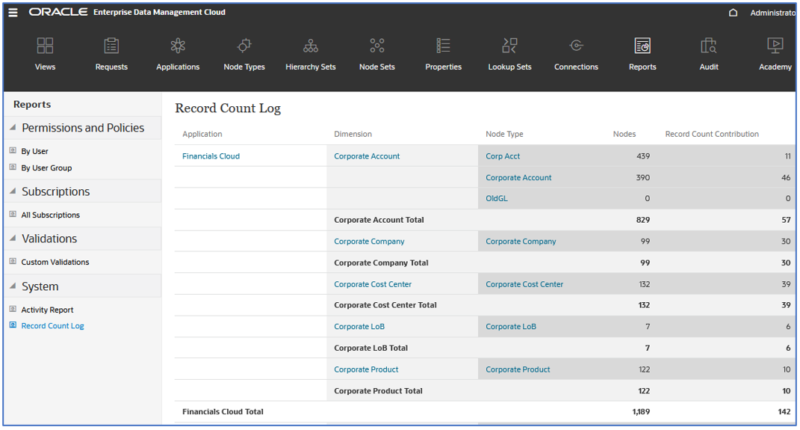Oracle’s Enterprise Data Management (EDM) cloud solution has recently received a wide array of enhancements. These enhancements span many different aspects of the offering and really address some crucial areas such as end-user usability, migration, and system information. The following sections highlight several of the key updates.
Agile Abilities Expanded
Application Templates allow customers to store an individual application’s artifacts (e.g. views, properties, data chain objects, etc.) in a json file. Service Administrators can then import the file into a separate EDM environment where the application does not exist. It should be noted that the templates contain artifacts only and do not include any data, requests, or transaction history.
This feature greatly enhances EDM’s ability to correlate with staggered deployments of target systems. For example, if an organization chooses to deploy a planning/budgeting application before a consolidation application, an application template file can be utilized to migrate only the planning/budgeting to production. A separate template file can be produced later to migrate the consolidation application.
User Experience Streamlined
Views are the mechanism for end user interaction with data in EDM. By default, all Views are visible to the end users. This can be confusing for users to navigate within deployments where many Views exist. However, EDM now provides the ability to filter which users/groups have visibility to each View in the system.
An additional update that improves the end user experience is the ability to enrich requests during after initial submission. It is common within many organizations that an approver or other users may need to correct a detail on a request, or add additional information prior to the request being committed to the data set. EDM permits users with the appropriate security to apply modifications to a request, rather than requiring everything to be provided at the time the request is originated.
Since its initial offering to the public, EDM has offered a great deal of auditing capabilities. In the recent update by Oracle, we see additional information being provided to users concerning requests. The Request Activity dashboard now provides the Request Type (e.g. Interactive, Subscription generated, Import) and the request Owner. Also, the Status and Stage columns have been combined.

Record Count Analytics
A new report is available starting with the 21.07 release. The new Record Count report provides administrators with the analysis of node counts across applications, dimensions and node types. The report then displays the unique instance count of nodes in order to provide a complete picture of the total record count. Everything is summarized to provide total counts (at the bottom of the report) which equate to the counts available on the “About” screen (accessible by clicking on username in the upper right corner of EDM).
Below is an example of the new report.

Contact us today to learn more about EDM’s latest update and why it’s a critical tool in the EPM landscape!

